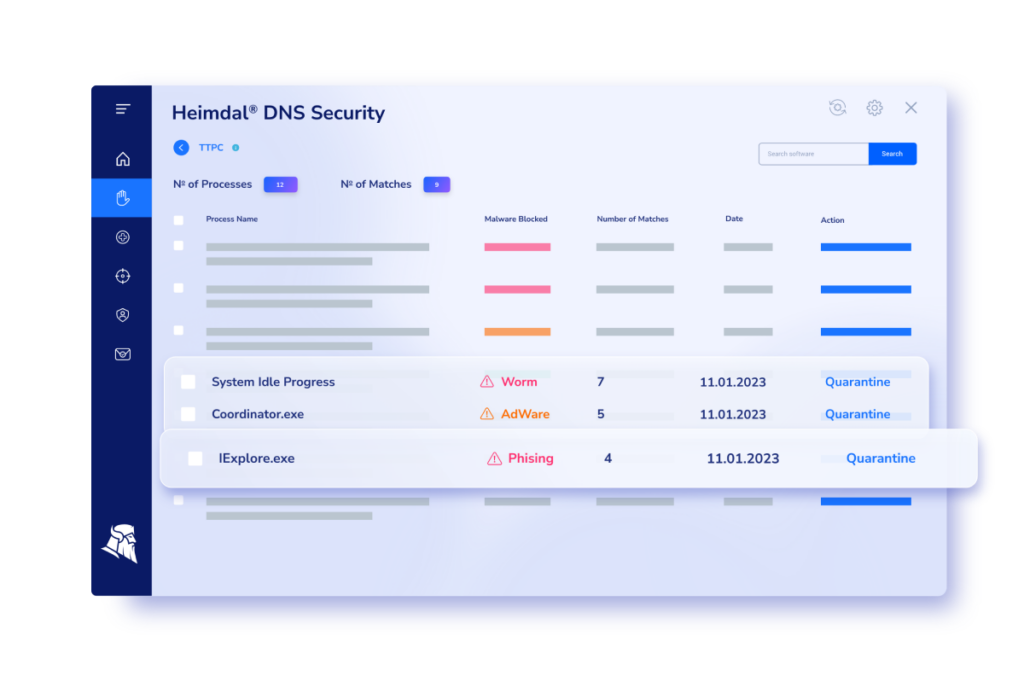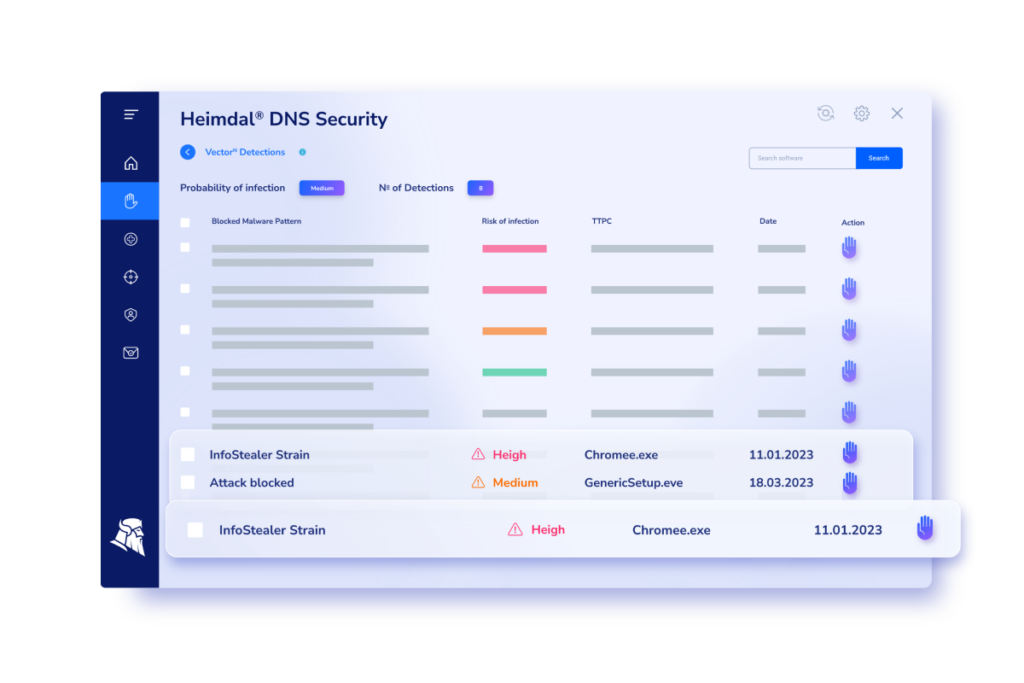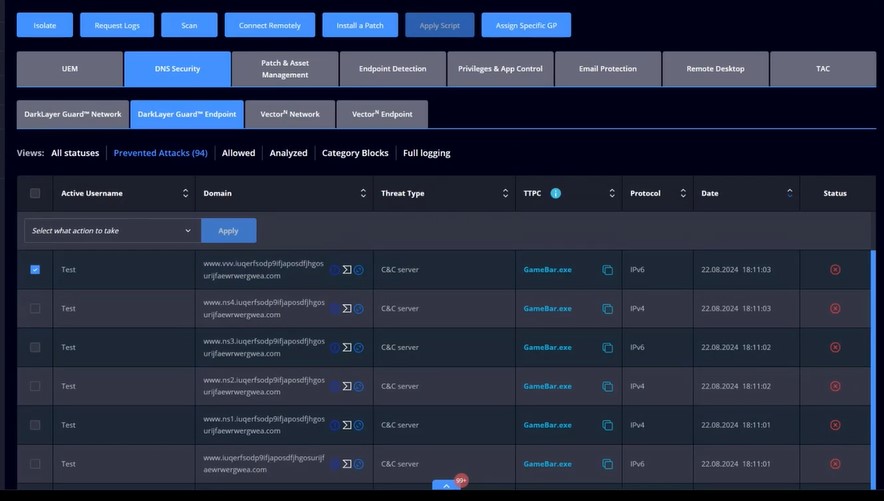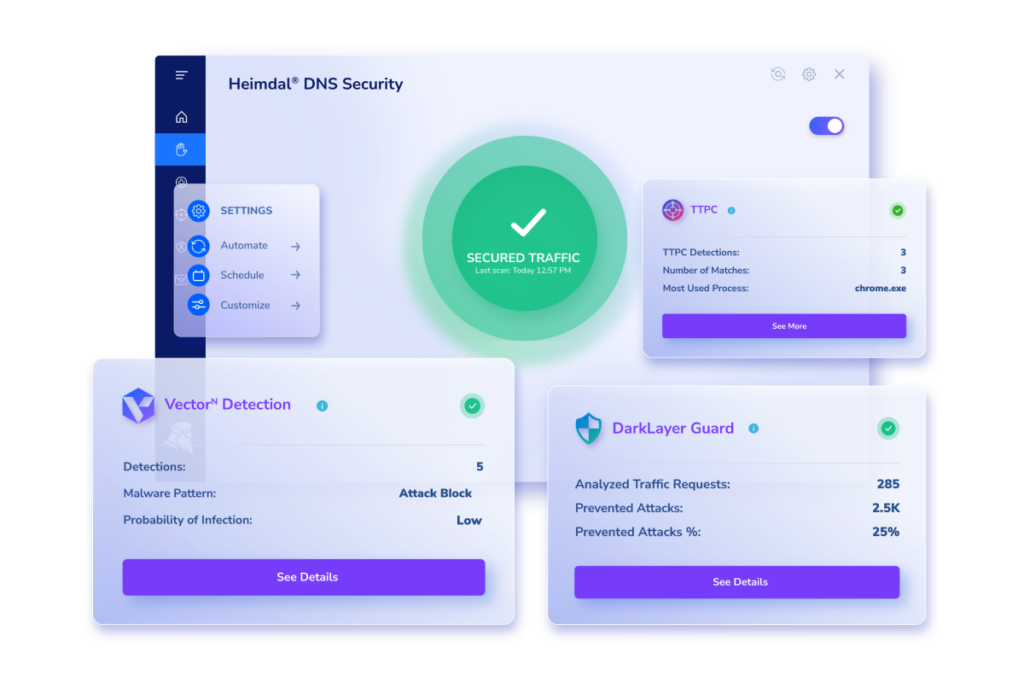DNS security is important for protecting corporate networks from DDoS attacks, phishing, ransomware, and data breaches.
The domain name system is the cornerstone of the Internet but is not safe by design. Multiple layers of protection — like DNSSEC and AI-powered solutions — are essential for DNS security.
This article highlights why DNS security is important and how it prevents cyber-attacks.
Key takeaways:
- Heimdal’s DNS filtering prevents ransomware in three ways
- DNSSEC is not enough to secure DNS infrastructure
- DNS security tools can stop phishing attacks even if the users click on a malicious link
- Using AI-powered DNS security solutions helps recognize unreported malicious domains with up to 96% accuracy
- DNS hijacking can redirect customers from your website to a malicious one
What is DNS security?
DNS security involves measures and protocols that safeguard the domain name system against manipulation and exploitation. The goal here is to keep DNS operational and safe from hijacking.
The goal here is to keep DNS operational and safe from hijacking. The DNS Security Extensions (DNSSEC) protocol provides an additional layer of security.
DNSSEC works by digitally signing data, ensuring the information received from a DNS query hasn’t been tampered with. However, it only verifies the authenticity of the DNS response. It doesn’t encrypt the actual DNS traffic or completely stop DNS attacks, such as
- Distributed Denial of Service (DDoS) attacks,
- DNS hijacking
- DNS tunneling
This means that DNSSEC, while important, is not enough to fully secure your DNS infrastructure. You need additional measures and solutions to close other vulnerabilities.
Read our detailed DNS security guide.
The DNS’s role in directing traffic on the internet makes it a critical point of security focus. Implementing DNSSEC is mandatory, but it doesn’t offer full protection.
Applying DNS security best practices and using a DNS security solution helps keep the infrastructure safe from DNS threats.
Why is DNS security important?
Without proper security, DNS is vulnerable to various forms of attacks. Hackers can exploit it, redirect users to malicious sites, steal data, or disable services.
DNS works like a postal system, delivering your queries to the correct addresses. If someone intercepts or tampers with those postal routes, your data can be sent to malicious locations without your knowledge.
Since most threats are deployed and executed online, DNS security is the first line of defense in a multi-layered security strategy. It helps prevent service disruptions and protects against malware deployment and data exfiltration that could compromise sensitive information.
Experts say that without DNS security, there is a 99% chance of encountering malicious domains when surfing the internet.
Here are some key highlights on why DNS security is important.
Protection against disruptions
Imagine if every directional sign in a city suddenly pointed in the wrong direction. A DNS attack creates the same chaos in online traffic.
When businesses experience these redirections, users can unknowingly land on harmful websites, resulting in potential data breaches and financial loss. DNS hijacking disrupts the trust and reliability of online services, often leading to reputational damage for businesses.
DNS security ensures the accuracy and reliability of online traffic, preventing unauthorized redirection. Just like correct street signs keep people on track, DNS security ensures that users reach the correct, intended sites, maintaining both service continuity and trust.
Data breaches prevention
DNS attacks like cache poisoning can redirect users to fake websites that look identical to the real ones.
Unsuspecting users who land on malicious sites enter their personal information, thinking they are in a safe environment. This trap is like giving your house key to a thief disguised as a doorkeeper.
Once hackers collect these compromised credentials, they can use them to gain unauthorized access to users’ accounts. This lets them retrieve more sensitive data, such as financial information, personal files, or corporate resources.
From there, attackers might escalate their access, using the credentials to perform identity theft or data exfiltration. This can lead to a widespread breach across multiple systems, causing extensive damage to both individuals and organizations.
Effective DNS security prevents such redirections, keeping users and their data safe.
[youtube https://www.youtube.com/watch?v=BZ5580XKIa8?si=SQlMto2-ZlzEiCmT]
Compliance and reputation
Maintaining DNS security is not just about protection but also about complying with data protection laws. A data leakage can bring severe penalties under regulations such as GDPR. Moreover, a company’s reputation is at stake. A single breach can lead to losing customers’ trust and long-term damage to the company’s brand.
Most common DNS threats
Hackers succeeded exploiting the domain name system’s vulnerabilities. Thus, they turned a critical internet function into a weapon.
Here are some of the most common and dangerous DNS threats:
DoS and DDoS attacks
DoS (Denial of Service) and DDoS (Distributed Denial of Service) attacks flood networks or services with traffic, making them inaccessible. These attacks are similar to a random crowd blocking the entrance to a shop, preventing legitimate customers from entering.
Denial of service attacks turn services unavailable, cause money loses, and customer dissatisfaction.
A prolonged DDoS attack could even temporarily force businesses to shut down. For instance, in 2016, a massive DDoS attack on Dyn, a DNS service provider, put offline major websites like Twitter, Netflix, and Reddit for hours.
DNS hijacking
DNS hijacking means attackers redirect legitimate DNS queries to a malicious DNS server.
Remember when I said some DNS attacks are similar to someone changing the street signs? An incorrect sign can cause people to drive to dangerous locations without knowing. DNS hijacking has the same effect. It redirects users to a fake website where attackers can steal login credentials, credit card details, or other sensitive information.
These data are then used in other attacks, like social engineering, online impersonation, financial fraud, identity theft, etc.
In 2019, Google and Amazon suffered from large-scale DNS hijacking attacks. User traffic was rerouted through malicious servers, in some cases exposing sensitive data.
DNS spoofing
DNS spoofing involves altering DNS responses. Thus, the user land on a malicious site that the attacker controls.
A DNS spoofing attack is similar to a scammer replacing the official signs on a bank building with counterfeit ones, redirecting customers to a fake bank that looks real. This threat can lead to data theft, unauthorized access, and malware distribution.
DNS cache poisoning
DNS cache poisoning inserts false data into a DNS resolver’s cache, causing it to return an incorrect IP address and redirect users to malicious websites.
Imagine someone slipping a false map into the hands of travelers who are unaware that they’ve been redirected to dangerous areas. DNS cache poisoning affects individual users and the broader network, as poisoned caches can redirect thousands of users to harmful destinations.
The 2008 Kaminsky DNS vulnerability demonstrated how attackers could poison DNS caches worldwide. This led to a rush in DNS security overhauls across the internet.
DNS security use cases
DNS security tools are an effective antidote to threats like phishing, malware deployment, and ransomware. By preventing malicious connections, they stop threats outside the system.
Here’s how this works to protect your IT environment.
Turn phishing attacks ineffective
Hackers use phishing to harvest credentials and download malware. If the phishing attack is successful and they compromise the victim’s credentials, they can:
– gain initial access into a system
– launch further social engineering attacks
– attempt identity fraud and online impersonation
Best DNS tools in 2024 can save your privacy, money and time by preventing all the above.
[youtube https://www.youtube.com/watch?v=iGzjb5S0CJQ?si=CB1_pTMEwLVUyWj8]
If you click on a fake bank email link, a DNS filtering tool will instantly block the malicious site. It would stop the attack immediately and prevent you from sharing credentials or other sensitive data with a malicious third party.
Not all DNS security tools are as good at detecting harmful sites. Traditional ones only use blacklists of websites that other people already reported as being malicious.
But hackers now use domain generation algorithms to produce thousands of malicious domains at a glance. This makes filtering by using blacklists or whitelisting ineffective.
Tools like Heimdal’s DNS Security module can now recognize a malicious site before anyone else flags it. Their superpower is the usage of AI & machine learning engines. For example, Heimdal’s Predictive DNS can spot and block an unreported malicious site with 96% accuracy.

Stop malware deployment
DNS security prevents malware from reaching corporate networks. How? By recognizing and blocking malicious domains that attempt to communicate with your endpoints.
For example, DNS filtering can prevent malicious advertising from convincing an unsuspecting user to download forged software on their computer. Imagine one of your colleagues in Marketing needs to use a video editing tool. They might attempt to download a random one on their device. Or download content from a website hosting such a tool. This can result in them unwillingly downloading malware from the company’s machine.
In this case, if you’re using Heimdal DNS Security Endpoint, here’s what happens. Heimdal’s predictive DNS engine starts analyzing the suspicious domain. For that, it uses an AI algorithm that checks:
- the domain’s authority
- how many users visit that domain
- is the content spoofing other domains, etc.
The DNS security software also checks if the domain is on specific blocklists. The result is a maliciousness score, which indicates 96% accuracy in determining whether the domain is malicious or not.
The filtering tool blocks all communication from that server if the answer is positive. It all happens in a few seconds. Your colleague will simply get a “Couldn’t find page message.” His device will be safe from any malware that he might have unknowingly deployed.

Prevent ransomware attacks
Hackers need to communicate with their command-and-control (C2) center to exfiltrate data. Heimdal`s AI & ML algorithm, which the DNS Security Endpoint tool uses, will block communication with the malicious domain that hosts the C2 server.
Imagine a healthcare organization facing a ransomware attack, with hackers trying to steal patient data. Heimdal’s DNS Security Endpoint would stop the ransomware in three ways:
- First, if someone tries to install malware, Heimdal’s DNS filtering blocks the malicious communication, stopping the attack before it can take root.
- Second, if the malware does get installed, Heimdal will detect and block communication to the attackers’ command-and-control (C2) server, preventing the ransomware from encrypting files or spreading further.
- Third, if the attackers try to exfiltrate data, Heimdal’s DNS filtering tool will block this communication, too, ensuring patient data remains secure.
This multi-layered protection would disrupt the ransomware attack at every stage, keeping the healthcare organization’s operations and data safe.

How to secure DNS
Securing DNS requires a multi-layered approach, as DNS can be vulnerable at various points in the process. The following are some of the best practices to ensure a robust DNS security framework:
1. Use multiple DNS servers
Reliance on a single DNS server creates a single point of failure. Using multiple DNS servers distributed across different locations or networks ensures that others remain operational even if one is compromised.
2. Implement DNSSEC
DNS Security Extensions (DNSSEC) adds an additional layer of security by ensuring that DNS responses are valid and unaltered. DNSSEC helps prevent man-in-the-middle attacks where attackers intercept and modify DNS queries.
Imagine sealing a letter in an envelope so you can be sure it hasn’t been tampered with before it reaches its destination. Implementing DNSSEC is a mandatory DNS security measure. Unfortunately, it’s not enough by itself.
3. Set firewalls
Firewalls are critical for filtering incoming and outgoing traffic, ensuring that only legitimate DNS queries and responses pass through. They act as gatekeepers, checking every request and blocking suspicious activity.
A firewall acts like a security guard standing at the entrance to a building, validating IDs before granting access.
4. Change default DNS port settings
Attackers often exploit systems that use default port settings. Redirecting DNS to different ports makes it harder for attackers to target your DNS servers.
It’s like changing the locks on your doors after moving into a new house. You make it harder for anyone with an old key to gain entry.
Using AI in DNS Security
One of the current trends in cybersecurity is using AI and machine learning to hunt threats. Thus, you can detect unknown threats based on behavioral analysis.
Like most tools, AI can be used for a good purpose or to inflict more damage. Hackers are increasingly using AI to automate and optimize their attacks. Here’s how:
- Faster vulnerability scanning to identify potential victims.
- Creating more convincing phishing content.
- Managing large-scale attacks with minimal human oversight.

For instance, recently, cybercriminals used AI to generate phishing emails that were indistinguishable from legitimate company communications. This increased their success rate in stealing user credentials.
To stop such attacks, Heimdal’s DNS security solution leverages AI and machine learning. Its algorithm analyzes vast amounts of DNS data to identify anomalous patterns and behaviors.
This enables the solution to proactively detect and block DNS tunneling, DNS hijacking, and other sophisticated attacks that traditional security methods miss. Heimdal’s AI-powered solution also continuously adapts to recognize new threats. Thus, it remains effective against emerging cyber threats.
[youtube https://www.youtube.com/watch?v=DK4PRpdjp_I?si=zPKbvvtmuce_xrCT]
Conclusion
DNS security plays a key role in securing corporate infrastructures by preventing malicious communication across the network. With the rise in DNS-related threats such as phishing, malware, and data breaches, protecting the DNS layer has become necessary.
To avoid being victim to DNS tunneling or hijacking and prevent any malicious online communication:
- Implement DNSSEC to authenticate DNS responses.
- Use multiple DNS servers and firewalls to add layers of protection.
- Consider AI-powered DNS security tools like Heimdal’s DNS Security Endpoint for real-time threat detection and prevention.
Frequently Asked Questions (FAQs)
What is the difference between DNS and DNSSEC?
DNS (Domain Name System) is a service that translates human-friendly domain names into machine-readable IP addresses. This enables users to access websites using familiar names instead of numerical IP addresses.
Specifically, DNSSEC (DNS Security Extensions) enhances the DNS system by adding digital signatures to DNS data. This ensures that the information comes from a trusted source and has not been tampered with during transmission.
DNSSEC prevents attackers from tampering with or forging DNS data, helping to protect users from malicious redirects.
How can DNS hijacking affect my business?
DNS hijacking undermines the security of your internet presence and can damage your brand’s reputation and reliability.
DNS hijacking can severely impact your business by redirecting your customers from your legitimate website to malicious ones. This can lead to:
- Losing your customers’ trust
- Theft of sensitive customer information
- Financial fraud
What are the signs of a DNS attack?
Signs of a DNS attack include:
- Unusual increase in network traffic.
- Unexpected redirects to unfamiliar websites.
- Frequent unexplained downtime.
- Changes in network performance.
Users might also receive security alerts from their antivirus software about attempted connections to known malicious sites. Observing these signs should prompt an immediate review of DNS security practices.
Is DNS security necessary for small businesses?
Yes, DNS security is essential for small businesses. Cyber attackers often target small businesses because they know they usually have less robust security measures. Also, mass vulnerability scanning tools that hackers use nowadays make no difference between large or small brands.
Without DNS security, small businesses are just as much at risk of phishing attacks and malware infections as large companies. The main difference is that they will find it harder to recover due to having less resources.
Implementing strong DNS security practices helps them keep safe.





